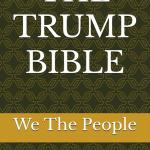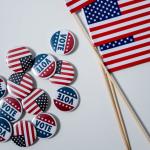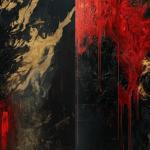Tribulation Force, pp. 82-85
Buck and Bruce need to discuss Buck's impending confrontation with the Antichrist, so they head out to a local restaurant and settle into "a booth in a dark corner of a noisy pizza* place."
A busy restaurant seems like an oddly public place to discuss their ultra-secret strategies for their covert resistance squad. When the topic of conversation is vigilance against your enemy's spies, you'd think somewhere less conspicuous might be preferable. But this is probably less odd than the fact that the restaurant is crowded and boisterous so soon after the Event.
I really am trying not to dwell on this point, but it's inescapable. Nothing in this book is compatible with its supposed post-Event setting and the reader slams into the discrepancy on every page. The authors' denial of their own context and betrayal of their own premise makes every conversation, encounter, church service, workplace, news report and phone call in this book ring false. It makes everything jarringly wrong.
Buck is about to fly to New York to meet with Nicolae Carpathia face to face. His travel arrangements have all been made and he's already told Alice he's going. First, though, we get yet another belabored discussion in which Buck pretends he hasn't yet made up his mind about going, and yet more discussion of our protagonists' very limited understanding of the dangers involved.
"I'd sure like to get Rayford's and Chloe's input on this," Bruce says, but Buck didn't want them in on this conversation. He doesn't want the Steeles told of his trip until after he leaves because if Chloe knew he was going, she might want to talk to him first, and that would interfere with the whole passive-aggressive stiff-arm flirtation he's working with her. (Step 1: Leave ambiguous, ambivalent-sounding voicemail message. Step 2: Turn off the ringer on his phone. Step 3: Sulk when she doesn't immediately get in touch with him to pledge her undying love.)
Bruce reluctantly agrees. "If that's what you want. But you have to realize, this is not how I see the core group." The core group isn't supposed to keep anything secret from one another — it's meant to keep secrets from the rest of the congregation.
Bruce says he'll need to tell the Steeles eventually, because he'll need their help casting the defensive prayer spell that will shield Buck from Nicolae's mind-control mojo. He doesn't put it exactly like that. He says:
"Buck, if you go, you're going to want all the prayer support you can get."
And that points to the problem with how Bruce sees the core group. If more prayer from more people is better, wouldn't it make sense for Bruce to enlist the entire congregation in this effort? If Buck really needs "all the prayer … he can get," then why not get Loretta and the amorphous others in on the action too?
This prayer support, Bruce says, will be needed because Nicolae is dangerous. But neither he nor Buck seems to appreciate the nature or scope of that danger:
"He's a dangerous man and a murderer. He could wipe you out and get away with it. He did it before with a roomful of witnesses. On the other hand, how long can you dodge him? He gets access to your unlisted phone number two days after you move in. He can find you, and if you avoid him you'll certainly make him mad."
This very morning Bruce spent several hours explaining that the Antichrist will be a global dictator with supreme, unchecked power over every aspect of life. Here, though, he still seems impressed that Nicolae can "get away with" crimes without being captured by the authorities. There are no other authorities. Nicolae even has power over … the phone company (DUM dum dummm).
What Bruce still hasn't figured out is that Buck's meeting with the Antichrist also presents a very real danger for Bruce and for the rest of their little "force." Buck knows all of their secrets, so sending him off for a chat with a telepath might not be the best way to guard those secrets.
Here is the crux of Bruce's advice to Buck, the closest they come to a strategy for our hero's confrontation with the arch-villain:
"You can depend on God this time, too, Buck. But you should have some sort of plan, go over in your mind what you might say or not say, that sort of thing."
That's it. Buck is going to "go over in his mind what he might say." Because that worked so well the last time he tried it, approaching Chloe with his carefully rehearsed pre-planned conversation. She strayed from the lines he had scripted in his mind and he wound up eating Chinese takeout all alone.
The feebleness of Bruce's strategy — "some sort of plan … that sort of thing" — is inevitable once you set it in the context of the overall strategy, agenda and master plan of the Tribulation Force. The point here being that the Tribulation Force has no overall strategy, agenda or master plan. This is the problem underlying this entire book and, indeed, the entire series of books: Nobody in the Tribulation Force seems to know what a Tribulation Force is for or what one is supposed to do.
The TF has been presented as a kind of cell group of resistance fighters — the rag-tag rebellion up against the evil empire. But here we see that this just isn't true. One of their own has been granted access to the evil emperor himself and their only concern becomes how he will manage to get away unscathed. They're not acting or thinking like a resistance, but like fugitives.
How long can Buck "dodge" Nicolae, Bruce asks. How can he "avoid" him without "making him mad"?
What they ought to be asking here, instead, is something like, "Where can we get enough C-4 to do the job properly and how are you going to smuggle it into Nicolae's office?"
Nicolae Carpathia is the villain, the Beast, the conqueror bent on conquest whose evil scheme for world domination Bruce just spent the entire morning lecturing about. Buck will meet him face-to-face the next day. His options for this meeting boil down to two questions:
1. Should he try to kill Nicolae?
or
2. Should he try to convert Nicolae?
Buck's got a firsthand meeting with the Antichrist, so those are his only options. He can try one or the other or both, but he has to try.
If Bruce and Buck had discussed or even imagined those questions it would have gone a long way toward providing a longer-term agenda for Tribulation Force, the resistance cell, and toward providing an actual plot for Tribulation Force, the book.
The underlying assumption in those questions above — a mistake on my part — is that this is a story with heroes. Heroes are the people who, when the villain sets out to destroy the world, try to stop him. The options I've sketched out above for Buck reflect the two main approaches to trying to stop such villains — violence and redemption.
Here is the scene LaHaye and Jenkins are stumbling toward: Nicolae sits in his office, meditating on his evil scheme and the worldwide suffering it will cause. In walks the hero.
If that hero is anyone other than Buck Williams, then we're in for some fireworks. Pick a hero, any hero. In walks Buffy Summers, armed with wisecracks and a nasty scythe-looking thing, matter-of-factly informing Nicolae that his scheme stops, now. In walks the Doctor, unarmed except for a sonic screwdriver and a boundless, inexplicable confidence, cheerfully explaining to Carpathia that he gets
one last chance to do the right thing, to leave the planet alone fo
r good. Or else.
Substitute any hero you like. The exact proportions of violence/redemption threatened/offered may vary, but every hero will — one way or the other or both — step forward to try to stop him.** That's what "hero" means. In walks Sean Connery in a tuxedo, or Errol Flynn swinging in on a rope, or John Wayne with his hand poised above the holster, or Humphrey Bogart, looking disappointed that he's had to pull a gun like this.
It doesn't matter which hero, if they're a hero, they're going to seize on this opportunity to try to stop the villain.
But while the story of Tribulation Force — of the entire Left Behind series — has a villain, it has no heroes. These are books without heroes because they are set in a world without heroism — without the possibility of heroism. A world of inexorable prophecies and inevitable doom.***
My guess is that Bruce and Buck would see any effort to stop Nicolae as pointless. There's no sense in trying to kill him or to convert him because they already know that his evil scheme for world domination is prophesied to occur. He cannot be stopped.
Very well, what then is the point of having a Tribulation Force? Is it just a support group for the impotent? Is it a kind of Underground Railroad shielding believers from the Antichrist so that they can survive long enough to suffer and die, instead, from the unmediated wrath of god? Or is it an entirely otherworldly endeavor — an attempt to save the souls of those whose bodies are already a lost cause?
These aren't exclusively eschatological questions. The answers Tim LaHaye would give are the same for his readers — here, now, in the actual world — as for the characters living through the Tribulation in his novel. The strange, pointless fatalism of his eschatology is simply a reflection of a similar pointlessness in his ecclesiology. He can't imagine what the Tribulation Force is supposed to be doing because he can't imagine what the church is supposed to be doing. He's convinced that nothing can be done apart from standing aside and watching the fulfillment of prophesy unfold itself, and so he can't imagine anything else to do. No agenda, no strategy, no master plan. His novel without a plot arises directly from a view of life without a plot.
"You should have some sort of plan … that sort of thing." Just don't bother trying to fight or to redeem the villain. And don't try to stop his plan, it can't be done.
Inspiring, isn't it?
– – – – – – – – – – – –
* Jenkins doesn't say, but this is probably a factor in Buck's determination to return to New York. After years in the city, Buck now finds himself in a midwestern exurban sprawlville, where grabbing a slice on a Sunday evening involves getting in the car and driving to a chain restaurant in some dismal chain mall where, on ordering what they call "pizza," one receives instead something almost unrecognizable. This Not Really Pizza might not just convince Buck to visit his former home, it might convince him to move back. (Chicagoans may here rise to defend their city's delicious "deep-dish pizza," as they should. This is indeed a tasty foodstuff, but A: It is so utterly different from actual pizza that arguing about which is better is like trying to compare wine and beer, and B: I doubt the chain outlets in Carol Stream have really good deep-dish pizza either.)
** "What Would Jesus Do?" the T-shirt asks, and it's a relevant question in considering what purports to be a "Christian" novel with alleged heroes who regard themselves as followers of Christ. Jesus' approach always inclines more toward the redemptive end of the spectrum (although there was that bit with the moneychangers and all those "woe unto you" lists). I think of his approach to stopping the arch-villain's evil scheme as much the way Gandhi described it: "First they ignore you, then they ridicule you, then they fight you, then you win." How exactly that jujitsu of nonviolence would play out in Nicolae's office I couldn't imagine, but I'm sure that Jesus, like any other hero, would do something to stop the villain's diabolical scheme. He wouldn't just spend the whole time trying to figure out a way to escape without "making him mad." (Actually, Jesus' presence in that room would be particularly dangerous since — from what I understand of theoretical subatomic eschatology — any contact between Christ and Antichrist would result in an explosion creating a black hole.)
*** Since we invoked Terry Gilliam last week, let me do so again here to say this: The Left Behind series has far more in common with 12 Monkeys than its authors would ever admit.
















